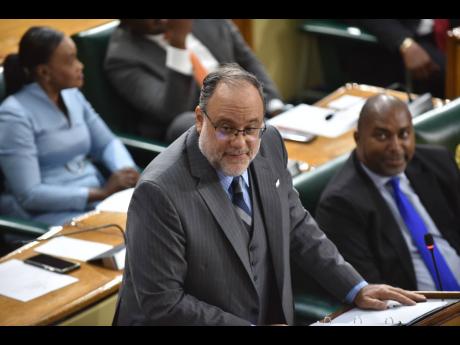Golding's eye on teachers
Opposition Leader Mark Golding targeted Jamaica’s 30,000 teachers in his contribution to the 2024-2025 Budget Debate on Tuesday, outlining several commitments to the group if the People’s National Party forms the next government.
Golding, who was making his presentation in the House of Representatives, is promising to offer student debt reductions and motor vehicle concessions which, he said, will increase with their years of service.
Golding has also pledged to give teachers enhanced access to National Housing Trust (NHT) loans and priority in housing allocations in NHT-financed schemes.
Teachers may also benefit from a packaged deal, to be negotiated by Government, for free Internet service as a tool of trade, Golding said.
Further, Golding said the Opposition recognises that the police, soldiers, teachers, nurses, civil servants and young professionals need access to affordable housing, so that must be the road to change.
He is proposing to:
● Repurpose the NHT to ensure that it focuses on the building of affordable housing.
● End the annual extraction of $11.4 billion from the NHT to support the Government’s budget and put this money into building affordable houses for our people.
● Complete the unfinished Operation Pride schemes so that the residents enjoy the full benefits of what was started for them.
On energy Golding is proposing to:
● Undertake a massive regularisation support drive for electricity connections, including a subsidy to help families meet the costs of rewiring, inspection and certification, and these families with solar panels to help them to manage their energy costs and build climate sustainability.
● Roll out a national Energy Efficiency, Natural Lighting & Passive Cooling programme, financed by local, regional and international development banks and private risk capital. The objective is to achieve an average 50 per cent reduction in residential energy consumption and cost, with a two-year payback.
For education, Golding is proposing to:
● Expand and improve the school feeding programme to ensure adequate and proper nutrition and encourage school attendance.
● Prioritise STEAM education across the education system.
● Provide one full scholarship for a university degree per family.
● Remove taxes from laptops and tablets for students, and provide every teacher with a laptop.
Under its newly coined SMART Programme — Sustainable Management of Agriculture through Research and Technology:
● Manage the sector through increased training of youth, and a focus on agricultural training institutions, 4-H Clubs and the extension services offered through RADA.
● Increase the productivity of farmers through the introduction of improved climate-smart farming systems and technology-driven farming operations.
● Expand and repair farm roads to enable farmers to access their farms and transport their produce to market.
● Partner with The UWI and other technical institutions to engage in research to boost productivity. The College of Agricultural, Science & Education (CASE) must be given the financial resources to do necessary research that will assist farmers to produce at a consistently high quality. The next PNP administration intends to upgrade CASE to a university, to enhance the focused institutional support required in the thrust for greater food security.
● Boost research facilities at Bodles, Orange River and Montpellier to provide the innovations required by farmers to grow the sector and provide food security for nation.
● Increase the use of drones, RFID, Hydroponic farming systems, solar operated irrigation pumps and infield monitoring of soil fertility status to boost production and increase productivity.
Security:
● Revitalise the Peace Management Initiative to build a network in all of the violence-prone communities across the country, rolling out restorative justice, mediation and other conflict resolution techniques at the community level.
● Train and empower 500 violence interrupters across Jamaica.
● Partner with the private sector and other stakeholders to expand Project STAR into a truly national programme, including access to training, mentorship, remedial education and job placements for youths at risk.
● Enact legislation that targets the known vicious purveyors of criminal violence across Jamaica and brings them to justice, including a Court-supervised process of pre charge detention that targets persons on whom there is credible intelligence to facilitate building viable cases that can result in successful prosecution.
● Bring much greater focus to reforming the prison system to reduce the high level of recidivism by rehabilitating offenders to become productive citizens rather than reoffenders when they return to society.
● Provide the police force with vehicles, equipment and training needed to efficiently respond to, investigate and prosecute offenders.
● Build out the Jamaica Eye system of cameras to enhance citizen security and ensure greater accountability for criminal behaviour
● Provide mental health support, including adequate rest, to law enforcement officers, to help them cope with the difficulties of their work in Jamaica.

